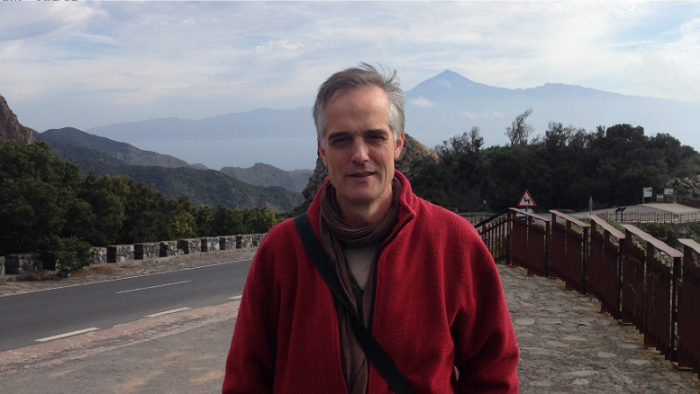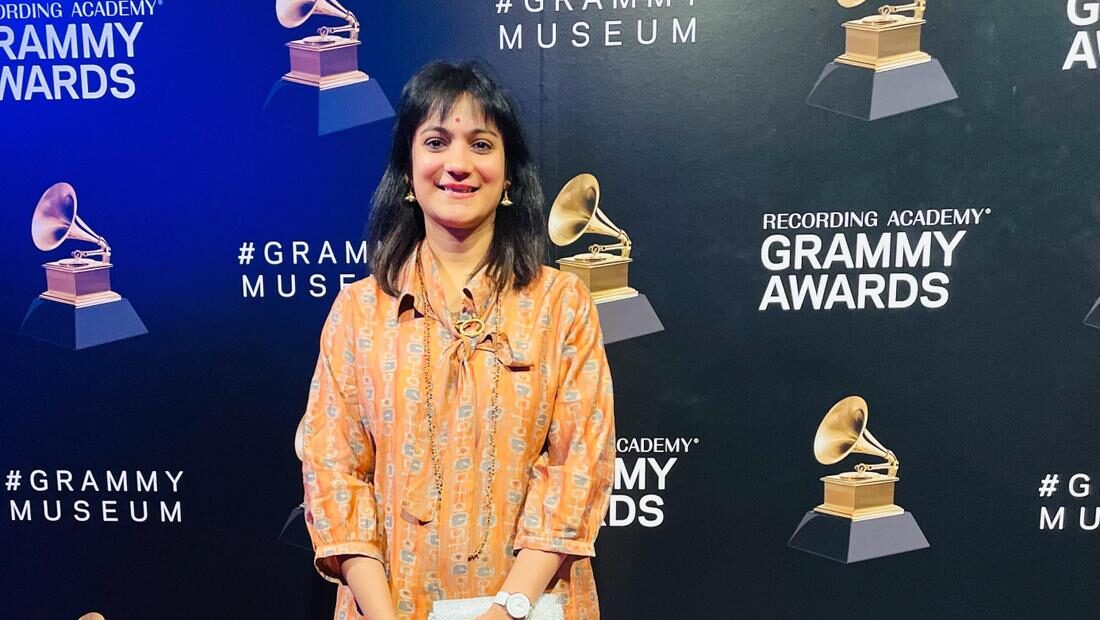Prof James Hartzell, a neuroscientist and Sanskrit translator published a study on the “Sanskrit Effect”. The birth of this study is an interesting turn of events. A ‘post-graduate’ Prof Hartzell sat in his neuroscience class and posed a question to his professor about the Vedic recitation tradition while they discussed the London taxi driver study. His professor, absolutely thrilled by this information, asked him to collaborate with the National Brain Research Centre to investigate the neuroscience associated with this tradition.
It so happened that Prof Hartzell was in India at a translators conference at the The Central Institute of Higher Tibetan Studies. And he thought oh, let me take the opportunity and visit Prof Nandini Chatterjee Singh (currently a cognitive neuroscientist at UNESCO MGIEP), for that. So, he spent a couple of nights at NBRC.
He then visited (Late) Professor RK Sharma, whom he had known for decades because they had worked together in New York and he visited Harvard sometimes and some of his professors also knew Prof Sharma well. At the time, Prof Sharma was known as the best Sanskrit speaker in India. Prof Hartzell sought his advice on this study. “He just listened to me without saying a word. I explained the logic behind all this because the question from a neuroscientific point of view is also very interesting: it had not been thought it was possible to master the degree of text memorization that the Vedic pandits do. The neuroscientific community did not think that this was technically possible for the brain. And I kept saying to them, that it exists, and they had been doing this for thousands of years,” expressed Prof Hartzell.
Prof Sharma was thrilled with the concept behind the study and he told Prof Hartzell to go to Ujjain and meet the Vice Chancellor of the Sanskrit University there, who also happened to be the national head of Maharishi Sandipani Rashtriya Ved Vidya Pratishthan. Prof Hartzell spent several hours with him singing poetry, and they spoke of the project too. He then took Prof Hartzell to meet the General Secretary of the Maharishi Sandipani Rashtriya Ved Vidya Pratishthan, who then took him to a National Vedic recitation event.
“There were all these Pandits reciting from different traditions. The General Secretary then asked me to get on stage and tell the community of my project. Firstly, the people were very receptive and enthusiastic about this idea, and secondly, they started asking me some impossible questions, for instance, can you show the effect of Vedic recitation on DNA. From a scientific point of view, that is an interesting question. Doing that is a very different story. We then went back to his Centre and met with his colleagues, and some of the pundits and so on. I found out that the Government Vedic organisation sponsors a whole bunch of Vedic recitation schools around the country which they've been doing, I think, since the 1950s. We decided to only work with the pundits from the government institutions,” explained Prof Hartzell.
And there is a certain advantage to that scientifically, which is that there is always a question- if you are a fantastically good violin player right, there is always a question, are you somebody who is genetically predisposed to be a fantastic good? Maybe you came from two parents who are musicians. You could not really separate out which part was the genetic predisposition and which part was related to having spent 20 years at a music school training eight hours every day.
Prof Hartzell wanted to see if there is a difference in the brains of the pundits relative to controls that we can reasonably and confidently say is related to their practice rather than that they were genetically predisposed
Indica Soft Power was in conversation with Prof Hartzell to learn more about his journey with this study.
- What made you gain interest in Sanskrit and to what degree had to learn?
Well, I did have several academic degrees in Sanskrit. I did an undergraduate degree at Harvard in Sanskrit and Indian studies. Then I did a masters there, and part of a PhD. I then ended up at Columbia University, where I finished my PhD. So I did another masters’ at Columbia in Indian religions. Primarily, I would say I was trained as a translator. So I'm competent in translating Sanskrit and Tibetan texts from a former time. That is my primary background as a trained Western academic translator.
It was quite challenging of course. But it is the training. We had classes; typically, in a class you would not have more than half a dozen people, maybe six or seven people at the most. The way the system I was training under works is you say, okay we're going to read this text for instance, in the second year, you read the Bhagavad Gita. So you read the entire Bhagavad Gita, and then every class the Professor assigns 20 verses or something like that. And then you have to go home and sit with your dictionary and other books and everything, and you have to figure out how to translate it and be able to explain the grammar.
You then go to class, sit around the table and the professor goes around the table. He says, “okay do Chapter three verse 23 and 24,” and you have to translate.
We also did other texts such as Shankaracharya’s or Kalidasa’s And also, I was also trained in something which is quite specific, it is known as translation Tibetan, where you have Sanskrit texts which were translated formally by the Tibetans, in teams, about 1000 years ago. They created things in Tibetan to deal with the Sanskrit syntax. So, for instance, the types of prefixes and suffixes which are super common in Sanskrit yet do not exist in the Tibetan language, so they created ways to translate those very specific links. So we were trained and all this kind of specialised stuff. And that's my background.
- What fascinated you about entering this particular study? Why the pundits?
My interest has been more of a scientific one rather than being religious, and it has been for a long time, I mean effectively, I think, from the very beginning, when I was eighteen, let's say when I started studying all these things. You can imagine, when you are 16 or 17, and you hear stories about levitating or you know also kind of magic tricks, and you are like oh that sounds cool… is that real.. is that true or is that just a story right..
I was raised in New York. Science seemed normal. Yes, science works, you can build computers and aeroplanes and things. My question from the very beginning was that of the many, many things from the big Indian tradition or the big Yoga tradition or the traditions of India, Tibet, China and Japan Southeast Asia, and all their different yoga practices etc, are real in a scientific sense? Can you measure it? Is it reproducible? Are the stories true on these kinds of things so that always has motivated my interest in the subject area. And then I got to the point where I had the opportunity to say all right, well, what if we start building a domain of genuine scientific research on this whole broad space that I just referred to.
And I had an opportunity to do that because I was doing a cognitive neuroscience PhD in Italy and they had an arrangement with the Indian National Department of Science and Technology with our particular university. They had set up, I think nanotech collaborations and genetics, they had a bunch of different collaborations going on with the researchers at this particular university, where I was. They were then looking to try to do something in neuroscience. So the story is just funny because it is a true story. I was a master student at the time before I did the PhD and we were covering the London taxi driver study. In the course, the Prof, a British guy says it would be kind of cool if we had something similar like this with regard to language.
So I raised my hand and asked my prof if he had heard about the Vedic recitation tradition in India. And he said no, so I explained to him. Because it was one of the many things we studied when I did my training. And I had been thinking at the back of my head, how to approach the science of the Sanskrit tradition, broadly speaking, like where to begin, because you can start under different places right. You could start with Hatha yoga, you could start with Raja yoga or you could even start with pranayama. I wanted to start with something that has never been done before.
It is respectful to the tradition to start at the beginning, so we started with the Vedas. I must admit that I didn't know a lot about the recitation tradition, but I knew it existed and I knew it had been around for 3000 years or whatever, or more probably. So, then I explained to my prof and he was thrilled. He said to me that the university has this collaboration with the Indian National Department of Science & Technology and that they had been looking for a neuroscience project. That was actually what happened. A team of professors, basically from our Centre for Mind Brain Sciences, went over to India. I was unable to join them on the trip to India. However, I prepared a presentation proposing this project to do a cross sectional study of the pundits who recite the Vedas.
At the time we had not selected which Vedic tradition. We wondered if we should do a cross sectional study along with structural and resting state scans, and maybe some DTI scanning. So the team went around to a bunch of different research centres and when they got to the The National Brain Research Centre, Dr Nandini Singh, who unfortunately did not have the time to work with us on this, told us to send a researcher to NBRC, and I went over and the process started.
- Why did you choose the Yajur Veda specifically?
The largest concentration of Vedic pandits in the sort of driving distance from the NBRC are the Yajur Veda pandits because the Yajur Veda has a very strong tradition in the Ganges river Valley. So it was a practical decision. Also, those involved in the project were associated with the government and they organised the pundits in terms of they spoke to the schools and they figured out who was willing to participate. Prof Nandini introduced us to a fellow researcher Tanmay Nath (now a postdoc in the USA), who was critical to the success of the project. He went to each of the schools and met with the pundits and explained the whole thing to them.
We had a small bump on the road when we chose the Yajur Veda pandits because when you are in an MRI scanner you cannot move. How are they going to recite if they have to use hand gestures!
I went to Tirupati, to the university and I talked to the university head there as I required his approval. He organised for a few Rig Vedic pandits to come and recite. Now they, for instance, do not use hand gestures. And why do they not use hand gestures? Because they are reciting poetry, and pure poetry has all of its rules so it is easy to stay exactly on time and in sync with your co-reciter. The Yajur Veda has a lot of prose and poetry. But when you are reciting prose, you have to have a way to coordinate the timing between you and the other. In fact the hand gestures are basically the syntax. And, it allows the reciters to stay in sync with each other as well.
- In layman terms, can you explain what the main inference of the study was?
I was down at Ujjain at a government office, and I remember there were three or four pundit teachers who came in. I decided to film their recital and they were reciting a section of something I cannot seem to remember now. I was very excited, you know, and they were using these hand gestures, and then they just suddenly stopped. I said to my host who was their boss, ‘what's the matter? what happened?’ He says they had made a mistake. I said that it doesn’t matter. The Pundit immediately said that it might not matter to you, but it matters to them, because they know that is how precise.
The simplest main inferences if you train at that level of precision, the grey matter density (so called, which is a curious word in science), in your brain will be significantly more in certain areas, than in people who do not train. So a correlation seems to be there, and this raises more questions but that's the simplest part of the study.
- Have you considered working on a similar project with Sama Veda?
Yeah it is actually a different type of practice in a certain way. We initially considered it and one of the things that Nandini did which we did not publish was she did a kind of sound envelope analysis of Gregorian chants compared to some of the Sama Veda chants and the curious thing was that they were quite similar in a certain way. When she compared the Gregorian chants to Rig veda or Yajur veda, the sound envelope was quite different and we thought Oh, this is interesting.
In terms of future studies you know if you rang some golden bell in some heaven somewhere and said all right, you can do any study you want, and you have the resources for it and the people willing to work together on it, then I would follow up with it.
I would love to study the Rig veda, work more with the Yajur veda. I would explore Sama and Atharva Veda, Kalidasa, and a whole bunch of stuff. And also what we did not do, and were planning to do is to do the functional study in the scanner. And there you have to try to partial out: is there a direct effect of reciting? Do those specific areas of the grey matter show higher activity? No one has ever tested. To do this study would be in that direction because then you want to go deeper and you want to see what is going on there. Are there different levels of activity in those parts of the grey matter that have higher density and structure, when the pundits recite Sanskrit and when they recite Yajur veda particularly?
The next thing you would want to know is if this is specific to only Sanskrit. For instance, there might be the case that anything they recited would trigger a very strong muscle memory in their brain. You know they are like bulked up and from a memory point of view or for instance, if they recited Hindi poetry.
The Indian cultural tradition, broadly speaking, is really sitting on a kind of an unbelievable treasure for the world. Since I am no longer working at that research centre and, at the moment I am not actually part of any research I do not know. If somebody comes along and says let's do it with the right kind of resources, in terms of funding, pundits, the right authorities to work with, I would jump at it.




